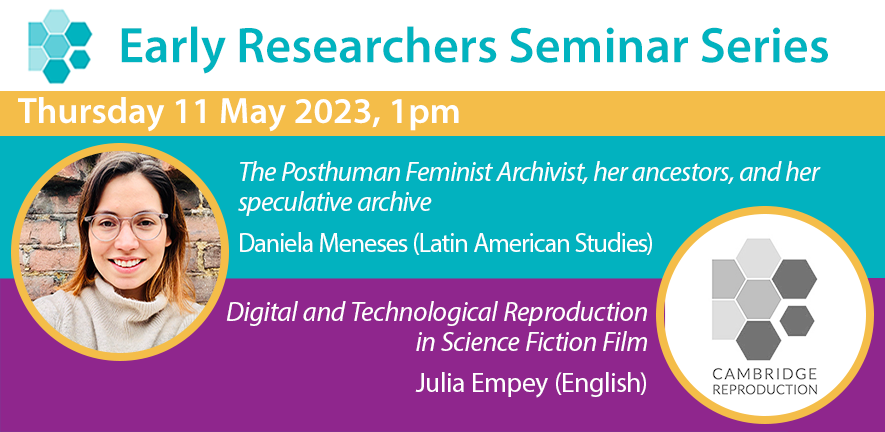
Thursday 11 May 2023, 1pm - 2pm
The Posthuman Feminist Archivist, her ancestors, and her speculative archive
Daniela Meneses (Latin American Studies)
Digital and Technological Reproduction in Science Fiction Film
Julia Empey (English)
Chair: Carleigh Morgan (MMLL)
The meeting will be held on Zoom: please contact Christina Rozeik to receive the Zoom details.
Speakers and abstracts
The Posthuman Feminist Archivist, her ancestors, and her speculative archive
Daniela Meneses (Latin American Studies)
I present the Posthuman Feminist Archivist (PFA) and her archive of feelings for and with pets. I explore what characterises this figure and then speculate on how her work of recording, cataloguing and storing images that capture the affective relationship connecting humans and domestic animals would look like.I argue that this archivist and her archive can serve as methodological tool for critical archive studies,and, more broadly, for multidisciplinary studies. I contend that starting with the PFA puts pressure on what we understand can count as a record and as an archive, and that it also signals a way for us researchers to engage in further work of creating material archives. I also engage with the ways in which the PFA and her speculative archive are a methodology that, while building on the work of authors such as Saidiya Hartman, Clare Hemmings and Donna Haraway, stands on its own. To do all this, I need to start with the beginning. Or, better said, I need to start with two beginnings, because to introduce the PFA I need to tell you not only about her birth, but also about her ancestry.
Daniela Meneses is a PhD researcher based at the Centre of Latin American studies. She holds an MSc Gender (Sexuality) from the LSE. Her work explores how a posthuman feminist approach can intervene in critical archive studies and animal studies. At Cambridge, she is funded by a Harding Distinguished Postgraduate Scholarship.
Digital and Technological Reproduction in Science Fiction Film
Julia Empey (English)
Utilizing Gattaca (1997) and Never Let Me Go (2010) as case studies, this paper examines how artificial methods of reproduction – particularly gene editing and cloning – are depicted in science fiction film. Specifically, this paper is interested in how these depicted negotiate the ethics, possibilities, and limitations of reproductive technologies and the broader implications of a further integration of technology in reproductive health. Through critical attention to these film’s formal elements, I am interested in how these depictions shape broader narratives regarding the liberating or disciplinary possibilities of the technologies.
As Teresa Heffernan argues, while science and scientific progress ostensibly offer new and equitable modes of reproduction, science is still, as Robin Burns argues, “translated into an ideology for socio-political practice through the application of empirical or pseudo-empirical techniques to the solution of social problems” (2). Here, science fiction “disrupts the linear, instrumental thrust of these fields” and turns science towards an ethical impulse (Heffernan 67). By critically examining how reproductive technologies are mediated through science fiction, the larger implications of these technologies, that these technologies are not discrete objects, but embedded within culture and ideology, are able to be anticipated and negotiated for our collective benefit.
Julia A. Empey received her PhD in English and Film Studies at Wilfrid Laurier University. Dr Empey is a SSHRC Postdoctoral Fellow in the Faculty of English at the University of Cambridge and a Research Associate at Cambridge Digital Humanities and Corpus Christi College. She is the co-editor of Feminist Posthumanism in Contemporary Science Fiction Film and Media: From Annihilation to High Life and Beyond (Bloomsbury, September 2023). Her research and publication interests focus on contemporary literature and film, feminist and posthumanist theory, and science fiction literature, film, and media.
The Early Researchers Seminar Series (ERSS) is a platform for PhD Students and early career researchers (ECRs) at the University of Cambridge with research foci on reproduction to share and discuss their research with other academics from a range of disciplines also researching reproduction at the University. Seminars are held on Zoom on the second Thursday of every month, 1pm - 2pm. For more information, and for the full 2022-2023 programme, please see the main ERSS page.


